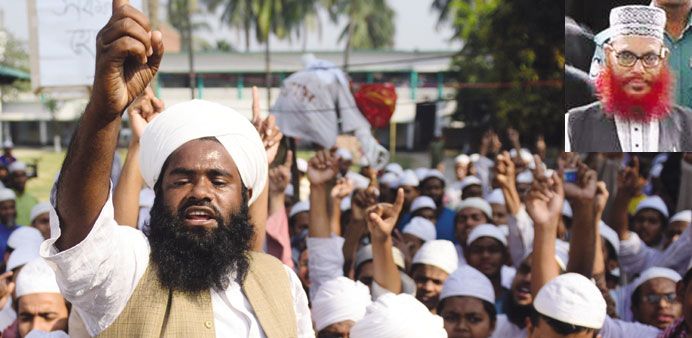Supporters of Islamic political parties shout slogans inside a madrasa during a nationwide strike in Dhaka last week. Jamaat-e-Islami called for a nationwide dawn-to-dusk shutdown today. Inset: The International Crimes Tribunal-1 to deliver in Delwar Hossain Sayedee case today.
By Mizan Rahman/Dhaka
Bangladesh’s Jamaat-e-Islami will enforce a nationwide dawn-to-dusk strike today to push for their demands, including the release of party leader Delwar Hossain Sayedee.
In a statement yesterday, Jamaat acting secretary Rafiqul Islam Khan gave the shutdown call to protest the repression of the opposition by the government.
The third verdict in the war crimes trial, this time on Jamaat-e-Islami leader Delwar Hossain Sayedee, is expected to be pronounced today, according to the International Crimes Tribunal-1.
ICT-1 chairman Fazle Kabir yesterday set the date for the verdict.
Several Jamaat-e-Islami and two Bangladesh Nationalist Party (BNP) leaders are standing trial for committing crimes against humanity during the Liberation War of Bangladesh in 1971.
In its first verdict on January 21, the ICT-2 awarded death penalty to absconding former Jamaat leader Abul Kalam Azad, also known as Bachchu Razakar.
In the second verdict on February 5, the ICT-2 handed down Jamaat-e-Islami assistant secretary general Abdul Quader Mollah life sentence, which sparked off a wave of anger and frustration, drawing youths to Shahbagh in Dhaka to form mass protests continuing to date.
The Islamist party had issued threat of a ‘civil war’ the day prior to the verdict on Quader Mollah.
Amid the heat of Shahbagh protests this month, the government made changes to ICT laws creating equal scope for both the prosecution and the defence to appeal against a verdict and also try an organisation for crimes against humanity.
Former lawmaker Sayedee was arrested on June 29, 2010 with charges of murder, loot and other crimes against him. The hearing in the case began on July 14, 2011.
The government yesterday said that Pakistan-based banned terror group Lashkar-e-Taiba is active in the country but law enforcement agencies have tracked down their network and kept them under “security vigil”.
“We have already brought the LeT operatives under security vigil... with the co-operation of people,” Bangladesh Home Minister Muhiuddin Khan Alamgir told reporters after attending a function of police detective school at Rajarbagh Police Lines.
He added: “It is the moral and legal obligation of the government to uproot them totally”.
The minister’s comment came as Bangladesh witnessed massive street violence during the past one month over the 1971 war crimes trial which convicted fundamentalist Jamaat-e-Islami stalwarts for carrying out atrocities and siding with Pakistani troops.
Law enforcement agencies had earlier said LeT and several other extreme right-wing militant groups were still active in Bangladesh while they used Bangladesh territory mainly for transit to neighbouring India for years together until 2006 but began to gradually lose their strength amid stringent security clampdown.

